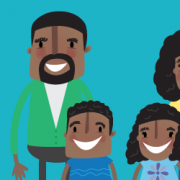Communication capers – the cow and the parrot
Begin by sharing the following knock-knock joke with your kids:
First person: “Knock, knock.”
Second person: “Who’s there?”
First person: “Interrupting cow.”
Second person begins to say: “Interrupting cow, who?” but is interrupted part-way through when the first person says, “Moo!”
Help your children to understand that although this joke is funny, it is not funny when we interrupt others in daily conversation. Continue the lesson by modelling two conversations between you and your spouse, or involving another adult.
In the first conversation, have one person behave like the “interrupting cow,” continually interrupting the other person. The second conversation, however, should demonstrate good listening skills. Ask your children to point out the differences between the two conversations. Emphasize that good listening skills involve facing the speaker and looking at them with undivided attention.
Introduce this next exercise by explaining that you want your children to communicate like a parrot, and not like an “interrupting cow.” Point out that people train parrots to talk by rewarding them for repeating back phrases spoken by their trainer. Explain that, like the parrot, your kids can show they have listened well by repeating back what someone has just said. Then introduce this “game” that allows your children to practice being “parrots” by reflecting back what others say. Take turns being the one who speaks first and the one who “parrots.”
Here are some examples for you to begin with:
Dad: “Please do up your seat belts before I start driving.
Child: “What I heard you say, Dad, was that you want us to do our seat belts up as soon as we get in the car.”
Child: “It would be nice to have hamburgers for supper tonight.”
Mom: “I think you are asking for hamburgers for supper tonight. Is that right?”
Mom: “I’m exhausted. While you were at school, I bought the groceries, paid some bills and met with ________.”
Child: “Are you tired from the all the running around you have done?”
Mom: “Yes. Thank you for listening.”
To further reinforce good listening skills say, “I think I can smell a cow!” whenever you notice your child interrupting. (Or create a similar gentle reminder.) Likewise, when your child “parrots” back what you have said, affirm them and let them know that you prefer the “parrot” over the “cow.”
Relevant Scripture
Proverbs 10:19 “When words are many, sin is not absent, but he who holds his tongue is wise.”
Proverbs 18:13 “He who answers before listening – that is his folly and shame.”






